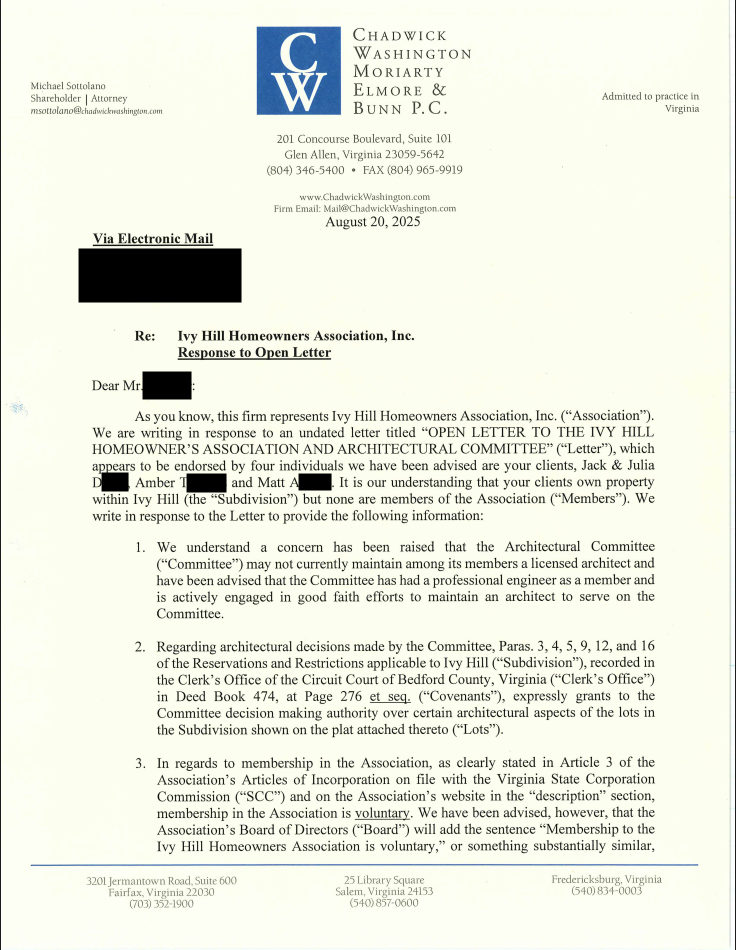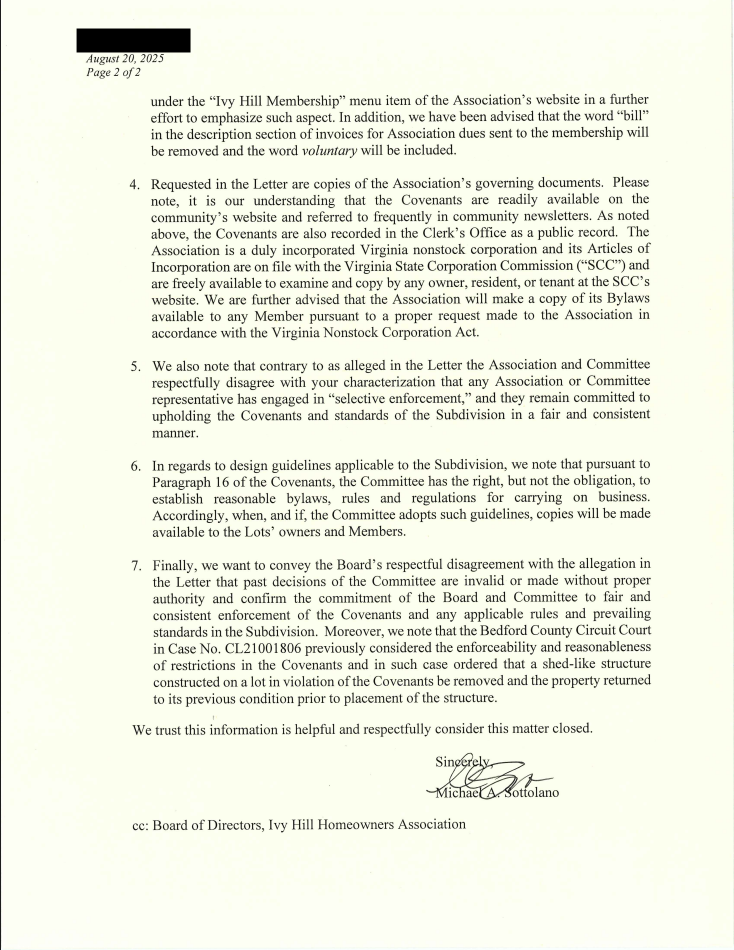On August 20, 2025, we received a response to the Open Letter that we had sent to the Ivy Hill Homeowners Association (IHHA) Board and the Architectural Committee (AC).
The response to the open letter, provided by Chadwick Washington Moriarty Elmore & Bunn P.C., on behalf of the IHHA, adopts a defensive and somewhat dismissive tone, largely contradicting or downplaying the concerns raised by the homeowners.
Here are some of my thoughts on the response.
Architectural Committee Composition
The open letter raised a concern that the AC has been operating for “at least four years without a licensed architect,” as explicitly required by the deed restrictions.1
The IHHA’s response offers a partial admission of this, stating the Committee “may not currently maintain among its members a licensed architect” but asserts it “has had a professional engineer as a member”. This does not address the requirement that a qualified architect be on the Committee. The requirement is not that the AC have a “qualified architect or engineer” on its membership role, but a “qualified architect”.
An engineer and an architect are not the same thing. The restrictions do not insist that the AC have an engineer, but “[o]ne member of such Committee shall be a qualified architect…”. It doesn’t say “can be”, it says “shall be”. There is no ambiguity here.
Another thing that the restrictions do not say is that it’s okay for the AC to operate while it makes a good-faith effort to find an architect. It could say that, if it had been written that way, but it wasn’t. It was written in such a way that an architect is a hard requirement.
But, let’s pretend, for the sake of argument, that it’s okay to operate while making a good-faith effort to find an architect to serve on the Committee:
- How many architects has the AC reached out to?
- How often was this raised as a pivotal issue in the meeting minutes?
The answer is nonsense. There is either a qualified architect serving on the AC, or there is not. According to an email from Sharon Mahon, there has not been an architect on the Committee for at least as long as she has been involved. If that is true, then the AC is completely invalid.
Voluntary Nature of IHHA Membership
We criticized the IHHA for presenting itself as a mandatory association, particularly through “bill”ing statements that did not clearly state that dues were voluntary.2 3
The IHHA concedes this point, confirming that membership is “voluntary” and promises to update the website to explicitly include the word “voluntary” in the membership description and remove the word “bill” from invoices. We consider this a small win, even though they have not agreed to refund people that they had previously scammed, which is unfortunate.
As of August 27, 2025, this change has not been made to the website.
Transparency and Document Access
The open letter highlighted a “lack of transparency” and resistance to providing homeowners with governing documents and records. Correspondence from Jack and Dan illustrate instances of great difficulty and delays in obtaining bylaws, financial statements, and other records, despite legal entitlements.
The IHHA, in its response, claims that copies of the Covenants (restrictions) are “readily available” on the community’s website and in newsletters. That is true, and we have never had any trouble accessing the Covenants.
The Articles of Incorporation are available at the SCC’s website. That is true.
The IHHA’s attorney claims that “the Association will make a copy of its Bylaws available to any Member pursuant to a proper request made to the Association in accordance with the Virginia Nonstock Corporation Act.”
I’ll save you the trouble of begging. The version I was eventually provided is available here.
Selective and Inconsistent Enforcement
We provided clear examples of inconsistent application of rules, referencing cases where sheds were approved after being installed through “informal compromises,” while pre- and correctly submitted, virtually identical requests, were denied. Sharon Mahon, the AC Chairperson, even confirmed via email that previously approved structures were “unfortunately installed before the required Request for Approval was submitted” and subsequently compromised on.
The IHHA’s response directly denies any selective enforcement, asserting that the Association and Committee “remain committed to upholding the Covenants and standards of the Subdivision in a fair and consistent manner”. This contradicts the specific incidents and admissions previously detailed.
I’m sorry, IHHA, but you cannot “remain committed” to something you were never committed to in the first place.
The IHHA’s response references a previous case where a court ordered a shed removed due to covenant violations. While this supports the IHHA’s enforcement power, homeowners argue that the defendant’s poor defense (some would argue lack of any defense) in that case prevented the court from scrutinizing issues such as selective enforcement or the AC’s legitimacy, which could have altered the outcome.
Decisions Made without Proper Authority
The open letter suggested that all decisions made by the AC when it was not properly constituted (i.e., lacking a qualified architect, or lacking the required number of members) are “legally questionable and, in our view, invalid”.
The response from the IHHA does not directly address or concede the invalidity of past decisions made by an improperly constituted Committee. Instead, it expresses “respectful disagreement” with the allegation that past decisions were made without proper authority.
IHHA / AC Relationship
Both Sharon Mahon, and the IHHA’s legal counsel, have previously stated that the IHHA and the AC are separate and distinct unrelated entities. The IHHA’s legal counsel has stated that it does not represent the AC, only the IHHA.
We disagree for several reasons.
This letter, which appears to make statements on behalf of the AC, supports our claim that they are related.
Conclusion
The IHHA’s formal response, delivered by its legal counsel, generally serves to defend the existing operations and decisions of the IHHA and AC.
While it makes a notable concession regarding the voluntary nature of its membership, it otherwise denies, minimizes, or reinterprets the core grievances concerning the AC’s composition, transparency, and inconsistent enforcement practices, often in direct opposition to detailed evidence and documented experiences presented by the homeowners.
This suggests a continued divergence in understanding an approach between the IHHA leadership and a significant portion of the Ivy Hill community.


- https://www.mihga.com/c/lets-break-them-down-the-ivy-hill-restrictions/#paragraph-16 ↩︎
- A Bill You Don’t Have to Pay ↩︎
- ivy_hill_bill_2025_letter ↩︎
Leave a Reply
You must be logged in to post a comment.